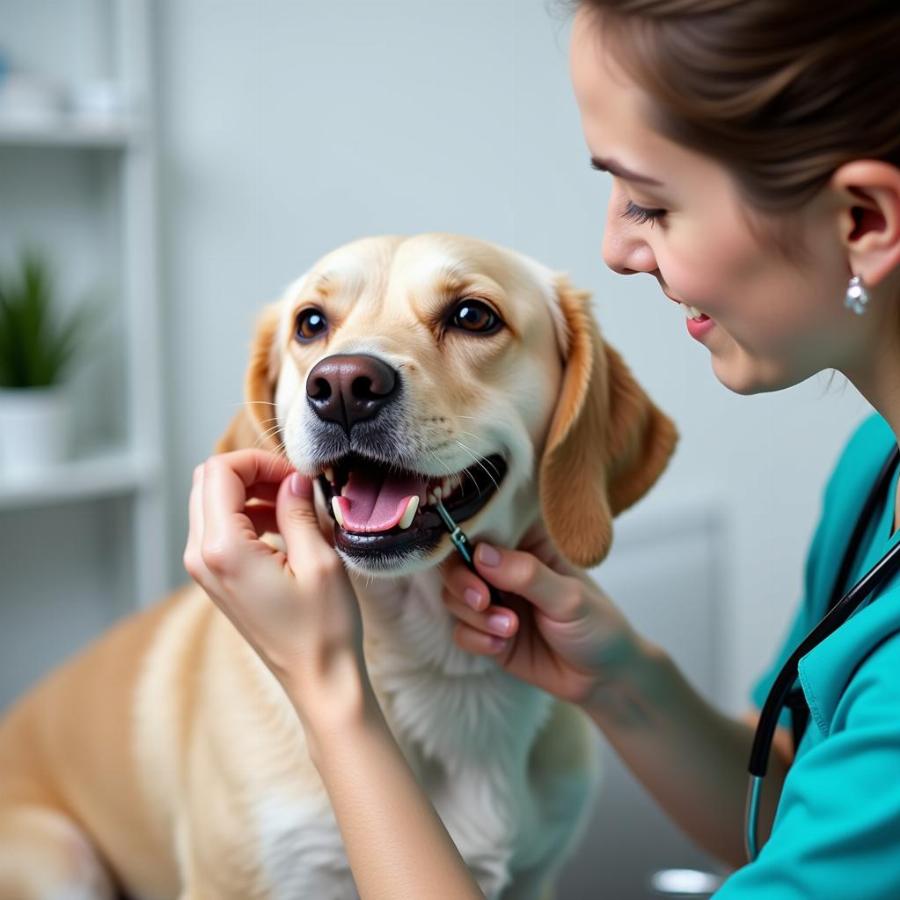A dog picky eater can be a source of frustration for any pet owner. You want the best for your furry friend, but they turn up their nose at seemingly everything. Understanding why your dog is a picky eater and knowing how to address the issue is key to ensuring they get the nutrition they need. This article dives deep into the world of the finicky canine palate, providing practical advice and solutions to help your picky eater thrive.
Understanding Why Your Dog is a Picky Eater
Several factors can contribute to a dog’s picky eating habits. Sometimes, it’s simply a matter of preference. Just like humans, some dogs have stronger opinions about food than others. However, underlying medical conditions can also play a role. Dental problems, gastrointestinal issues, or even allergies can make eating uncomfortable or even painful. It’s always a good idea to rule out any medical reasons for picky eating with a visit to your veterinarian.
Behavioral reasons are another common culprit. Perhaps your dog has learned that by refusing food, they’ll eventually get something tastier. Or maybe they’re simply not hungry enough because they’re getting too many treats or table scraps.
Addressing the Picky Eating Habit
So, what can you do about your dog picky eater? The first step is to establish a consistent feeding routine. Offer meals at the same time each day and remove any uneaten food after a reasonable period, usually 15-20 minutes. This helps your dog understand that mealtimes are structured and prevents grazing.
Another important strategy is to avoid giving in to your dog’s demands for tastier options. While it’s tempting to offer something more appealing when your dog refuses their food, this only reinforces the picky behavior. Stick to a healthy, complete and balanced dog food for picky eaters and be patient.
Making Mealtime More Appealing
While you shouldn’t cater to every whim, there are ways to make your dog’s food more enticing without compromising their nutrition. Try warming up their food slightly, as the aroma can be more appealing. You can also add a small amount of warm water or low-sodium broth to soften dry kibble. Sometimes, simply switching to a different flavor or texture of dry dog food for picky eaters can make all the difference.
When to Seek Professional Help
If your dog’s picky eating persists or is accompanied by other symptoms like weight loss, vomiting, or diarrhea, it’s crucial to consult your veterinarian. They can determine if there’s an underlying medical condition contributing to the problem. In some cases, they may recommend a picky eater dog remedy or a special diet.
Is my dog a picky eater?
If your dog consistently refuses their regular food, avoids certain types of food, or only eats when coaxed, they might be a picky eater.
What can I do if my dog won’t eat their food?
Try establishing a consistent feeding routine, avoid table scraps, and make the food more appealing with warm water or a different texture. If the problem persists, consult a vet.
How do I get my picky dog to eat dry food?
Introduce dry food gradually, mix it with wet food initially, and try different flavors or textures. You can also warm it up slightly to enhance the aroma.
Is it okay to give my picky dog treats?
Treats can reinforce picky eating. Use them sparingly and only for positive reinforcement during training.
Can medical conditions cause picky eating in dogs?
Yes, dental problems, gastrointestinal issues, and allergies can make eating uncomfortable. Consult a vet to rule out any medical causes.
Are there any specific dog food brands for picky eaters?
Several brands offer specialized formulas for picky eaters. Consider consulting dog food for picky eaters for more guidance. Remember, what works for one dog may not work for another, so it might take some experimentation to find the right fit.
 Dog Picky Eater Vet Visit
Dog Picky Eater Vet Visit
Conclusion
Dealing with a dog picky eater can be challenging, but it’s not insurmountable. By understanding the potential causes and implementing the strategies outlined in this article, you can help your furry friend develop healthier eating habits and enjoy their meals. Remember, patience and consistency are key.
For further advice and tailored recommendations, please don’t hesitate to contact us at [email protected]. Beaut Dogs (https://beautdogs.com) is your trusted resource for all things related to dog care, providing expert advice and a wealth of information to help you navigate the wonderful world of dog ownership. We’re committed to helping you provide the best possible care for your beloved canine companion.
FAQs
- What are some common signs of a picky eater?
- How long should I leave food out for my picky dog?
- Is it okay to mix wet and dry food?
- Should I hand-feed my picky dog?
- Can stress affect a dog’s appetite?
- What are some healthy food toppers for picky dogs?
- How can I transition my picky dog to a new food?
Do you have other questions related to dog care or looking for more specialized information? Check out our articles on gourmet killer dogs for in-depth insights and expert advice.